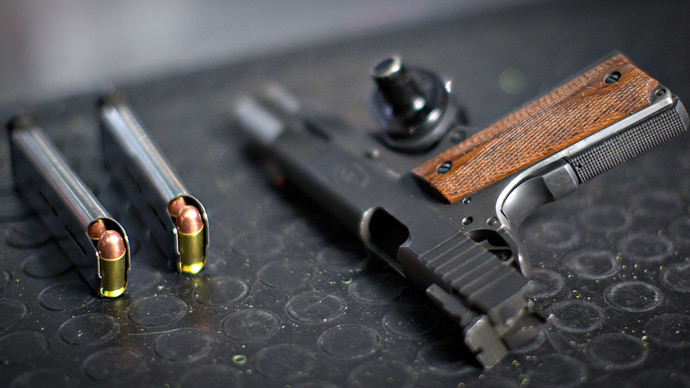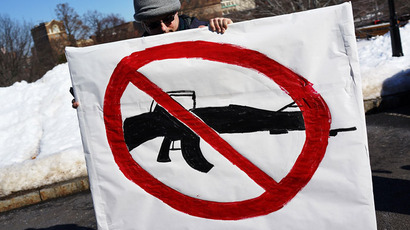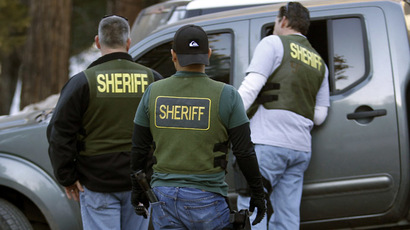Residents refuse to surrender high-capacity magazines as ban begins in California town

Gun rights advocates in two California cities are fighting back against recently passed legislation that restricts residents from possessing high-capacity magazines.
Starting last Thursday, anyone in Sunnyvale, CA caught with a magazine that holds more than 10 rounds of ammunition has been subject to a $1,000 fine, six months in jail or both.
A similar measure was passed in San Francisco, CA and is slated to be added to the books early next month. Efforts are underway to reverse these laws, though, and could drag the discussion all the way to the Supreme Court of the United States.
State law has for more than a decade banned the making, selling, giving and lending of these type of magazines within the borders of California, Josh Ruchman wrote for the San Jose Mercury News last week, but the “Measure C” initiative passed last year by 67 percent of the Sunnyvale’s electorate elevated the legislation on a local level so that it limits even the mere possession of these items.
Residents had until Thursday to turn in their magazines, Ruchman wrote, but by that afternoon he had come across some pretty shocking statistics:
“Sunnyvale police say nobody has showed up at the city's Department of Public Safety to turn over their magazines,” he reported last week.
One of those high-capacity magazine owners is 67-year-old Leonard Fyock, who is also a plaintiff in a lawsuit challenging the law filed by the National Rifle Association. Speaking to Ruchman last week, he said he simply gathered his soon-to-be-contraband ammunition holders and took them outside of Sunnyvale limits.
"I just thought, 'Well, this doesn't look good,'" he told Ruchman last Wednesday. "So my high-capacity magazines are already out of town.''
Others didn’t necessarily take the same course of action, however, and could have chosen to — now illegally — maintain possession of those magazines. Meanwhile, a similar situation has unfolded recently across the country in Connecticut, where RT reported last month that likely tens-of-thousands of gun owners were transformed into felons overnight due to a new law that forces residents to register powerful assault weapons with the state. Dan Haar, a journalist with Connecticut’s The Courant newspaper, said that as little as 15 percent of those gun owners actually complied by the law weeks after it went into effect.
But back in California, Fyock says that owning high-capacity magazines is necessary for self-defense. Both city officials and the federal court system so far seems to disagree, though, as evident by remarks made recently by leaders there and a ruling handed down over the Sunnyvale case just last Wednesday by US District Judge Ron Whyte.
“But let’s say an officer was called to someone’s home, and a large capacity magazine was found at their home,” Sunnyvale spokeswoman Jennifer Garnett told the Bay Area’s KQED News recently. “Then, yes, it’s legally possible they would be cited.”
Weighing in from a federal courthouse in San Jose, CA, Whyte added last week that the Sunnyvale ban doesn’t violate the Second Amendment-protected rights to own guns for self-defense since it doesn’t interfere per se with that ability. The NRA and others requested that Whyte impose a preliminary injunction against Measure C, which he denied.
“The right to possess magazines having a capacity to accept more than ten rounds lies on the periphery of the Second Amendment right, and proscribing such magazines is, at bare minimum, substantially related to an important government interest. No court has yet entered a preliminary injunction against a law criminalizing the possession of magazines having a capacity to accept more than ten rounds, nor has any court yet found that such a law infringes the Second Amendment. Upon the present record, this court declines to be the first,” he wrote.
“[I]t is rare that anyone will need to fire more than 10 rounds in self-defense,” Whyte said according to the Associated Press.
Lawyers for the NRA responded by filing an request with the US Court of Appeals for the Ninth Circuit in San Francisco asking judges there to intervene and place an emergency order to keep the ban from being enforced until arguments can be heard. The appeals court declined, prompting the NRA to ask Supreme Court Justice Anthony Kennedy to consider their plea.














